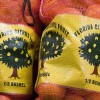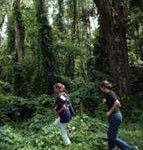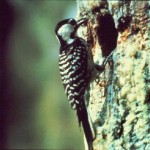 Worldwide and in Florida, food-related issues such as food safety, food security, and use of new food technologies continue to be top concerns. Among the food-related issues are concerns about consuming the products from transgenic plants, often referred to as “GMOs.” This 4-page fact sheet is intended to help Extension faculty understand public perceptions regarding the use of genetic engineering to combat citrus greening. Extension faculty can use this understanding of public perceptions as they develop and deliver programming for clientele. Written by Nicole M. W. Dodds, Laura M. Gorham, and Joy N. Rumble, and published by the UF Department of Agricultural Education and Communication, October 2014.
Worldwide and in Florida, food-related issues such as food safety, food security, and use of new food technologies continue to be top concerns. Among the food-related issues are concerns about consuming the products from transgenic plants, often referred to as “GMOs.” This 4-page fact sheet is intended to help Extension faculty understand public perceptions regarding the use of genetic engineering to combat citrus greening. Extension faculty can use this understanding of public perceptions as they develop and deliver programming for clientele. Written by Nicole M. W. Dodds, Laura M. Gorham, and Joy N. Rumble, and published by the UF Department of Agricultural Education and Communication, October 2014.
http://edis.ifas.ufl.edu/wc182
Tag: Nicole M. W. Dodds
Floridians' Perceptions of Invasive Species
 Invasive species are a serious threat in Florida. Invasive species are defined as non-native or exotic organisms, which cause ecological or economic harm or negatively affect human health in a new environment where they are not historically found. This 5-page fact sheet summarizes Florida residents’ perceptions, concerns, and knowledge about invasive species. This information will equip Extension faculty to more effectively communicate and educate clientele on this topic. Written by Nicole M. W. Dodds, Mary Hannah Miller, and Alexa J. Lamm, and published by the UF Department of Agricultural Education and Communication, October 2014.
Invasive species are a serious threat in Florida. Invasive species are defined as non-native or exotic organisms, which cause ecological or economic harm or negatively affect human health in a new environment where they are not historically found. This 5-page fact sheet summarizes Florida residents’ perceptions, concerns, and knowledge about invasive species. This information will equip Extension faculty to more effectively communicate and educate clientele on this topic. Written by Nicole M. W. Dodds, Mary Hannah Miller, and Alexa J. Lamm, and published by the UF Department of Agricultural Education and Communication, October 2014.
http://edis.ifas.ufl.edu/wc186
Floridians' Perceptions of Endangered Species
 In July 2014, the UF/IFAS Center for Public Issues Education in Agriculture and Natural Resources (PIE Center) initiated a study to explore the attitudes, perceptions, opinions, and knowledge of Floridians on endangered and invasive species. The majority of respondents to the survey have favorable views of endangered species but few consider themselves knowledgeable on the issue. This 4-page fact sheet can equip Extension faculty to more effectively communicate with and educate clientele about endangered species. Written by Mary Hannah Miller, Nicole M.W. Dodds, & Alexa J. Lamm, and published by the UF Department of Agricultural Education and Communication, October 2014.
In July 2014, the UF/IFAS Center for Public Issues Education in Agriculture and Natural Resources (PIE Center) initiated a study to explore the attitudes, perceptions, opinions, and knowledge of Floridians on endangered and invasive species. The majority of respondents to the survey have favorable views of endangered species but few consider themselves knowledgeable on the issue. This 4-page fact sheet can equip Extension faculty to more effectively communicate with and educate clientele about endangered species. Written by Mary Hannah Miller, Nicole M.W. Dodds, & Alexa J. Lamm, and published by the UF Department of Agricultural Education and Communication, October 2014.
http://edis.ifas.ufl.edu/wc185